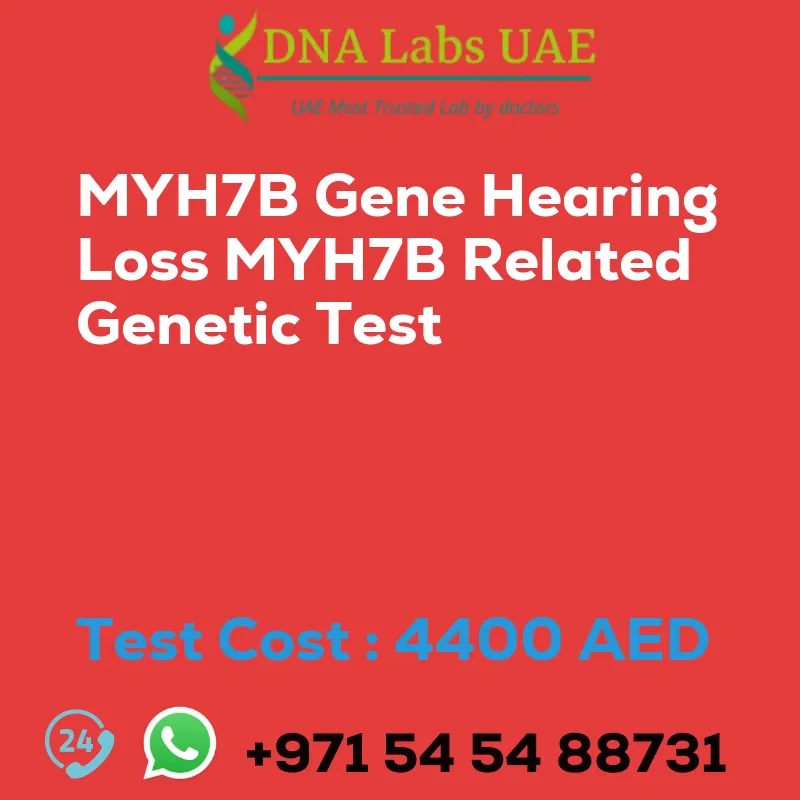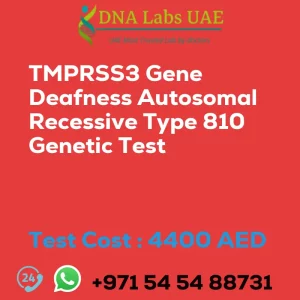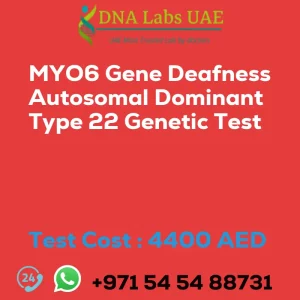MYH7B Gene Hearing Loss MYH7B related Genetic Test
Components:
- Price: 4400.0 AED
- Sample Condition: Blood or Extracted DNA or One drop Blood on FTA Card
- Report Delivery: 3 to 4 Weeks
- Method: NGS Technology
- Test Type: Ear Nose Throat Disorders
- Doctor: ENT Doctor
- Test Department: Genetics
Pre Test Information:
Clinical History of Patient who is going for GJB2 Gene Deafness with keratopachydermia and constrictions of fingers and toes NGS Genetic DNA Test. A Genetic Counselling session to draw a pedigree chart of family members affected with GJB2 Gene Deafness with keratopachydermia and constrictions of fingers and toes NGS Genetic DNA Test gene GJB14.
Test Details:
The MYH7B gene is a gene that encodes for the myosin heavy chain 7B protein. This protein is involved in muscle contraction and is predominantly expressed in the heart and skeletal muscles. Mutations in the MYH7B gene have been associated with various conditions, including hearing loss.
Specifically, mutations in this gene have been found to cause non-syndromic hearing loss, which means that hearing loss is the only symptom present and is not associated with other physical or developmental abnormalities.
To determine if a person has mutations in the MYH7B gene that may be causing their hearing loss, a genetic test can be performed. This test is typically done using next-generation sequencing (NGS) technology, which allows for the simultaneous sequencing of multiple genes.
During the NGS genetic test, a DNA sample is obtained from the individual, usually through a blood sample or a cheek swab. The DNA is then sequenced to identify any variations or mutations in the MYH7B gene. These variations can be compared to a reference sequence to determine if they are disease-causing mutations.
If a disease-causing mutation is identified in the MYH7B gene, it can help to provide a genetic diagnosis for the individual’s hearing loss. This information can be valuable for understanding the underlying cause of the hearing loss and may also have implications for treatment and management.
It’s important to note that genetic testing for MYH7B mutations and other genetic causes of hearing loss is typically only recommended for individuals with a strong family history of hearing loss or those with specific clinical features suggestive of a genetic cause. A healthcare professional, such as a genetic counselor, can provide guidance on whether genetic testing is appropriate in a given situation.
| Test Name | MYH7B Gene Hearing loss MYH7B related Genetic Test |
|---|---|
| Components | |
| Price | 4400.0 AED |
| Sample Condition | Blood or Extracted DNA or One drop Blood on FTA Card |
| Report Delivery | 3 to 4 Weeks |
| Method | NGS Technology |
| Test type | Ear Nose Throat Disorders |
| Doctor | ENT Doctor |
| Test Department: | Genetics |
| Pre Test Information | Clinical History of Patient who is going for GJB2 Gene Deafness with keratopachydermia and constrictions of fingers and toes NGS Genetic DNA Test. A Genetic Counselling session to draw a pedigree chart of family members affected with GJB2 Gene Deafness with keratopachydermia and constrictions of fingers and toes NGS Genetic DNA Test gene GJB14 |
| Test Details |
The MYH7B gene is a gene that encodes for the myosin heavy chain 7B protein. This protein is involved in muscle contraction and is predominantly expressed in the heart and skeletal muscles. Mutations in the MYH7B gene have been associated with various conditions, including hearing loss. Specifically, mutations in this gene have been found to cause non-syndromic hearing loss, which means that hearing loss is the only symptom present and is not associated with other physical or developmental abnormalities. To determine if a person has mutations in the MYH7B gene that may be causing their hearing loss, a genetic test can be performed. This test is typically done using next-generation sequencing (NGS) technology, which allows for the simultaneous sequencing of multiple genes. During the NGS genetic test, a DNA sample is obtained from the individual, usually through a blood sample or a cheek swab. The DNA is then sequenced to identify any variations or mutations in the MYH7B gene. These variations can be compared to a reference sequence to determine if they are disease-causing mutations. If a disease-causing mutation is identified in the MYH7B gene, it can help to provide a genetic diagnosis for the individual’s hearing loss. This information can be valuable for understanding the underlying cause of the hearing loss and may also have implications for treatment and management. It’s important to note that genetic testing for MYH7B mutations and other genetic causes of hearing loss is typically only recommended for individuals with a strong family history of hearing loss or those with specific clinical features suggestive of a genetic cause. A healthcare professional, such as a genetic counselor, can provide guidance on whether genetic testing is appropriate in a given situation. |








